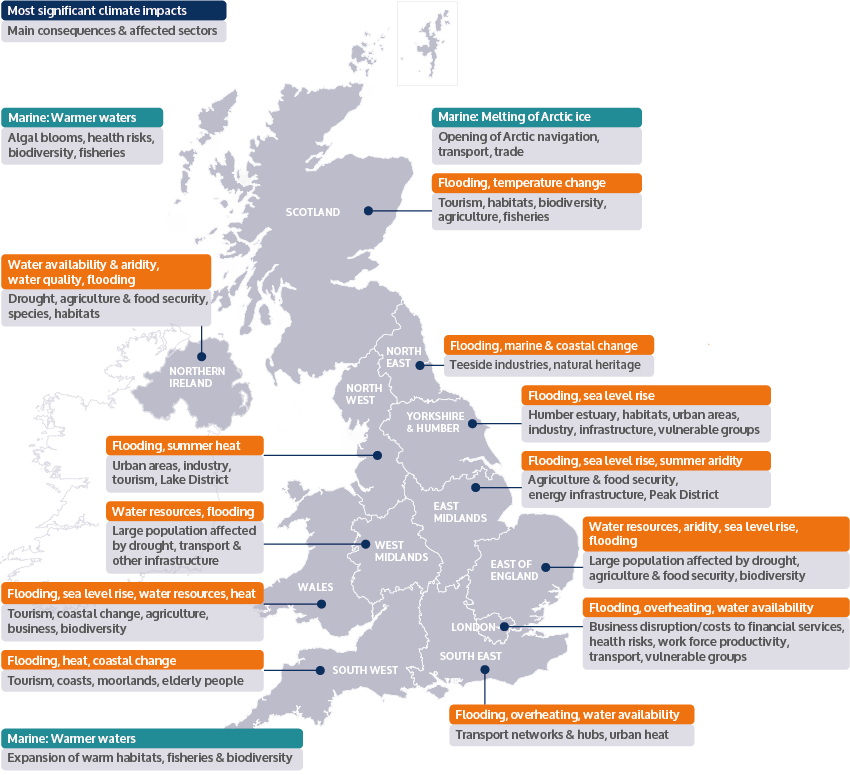The
British Isles are perched at the western edge of the Eurasian land
mass and experience a temperate climate, dominated by the influence
of the Atlantic Ocean. British people are notorious for talking about
their weather, which is extremely changeable, but rarely think about
climate. This paper will however argue that there is clear evidence
that the climate of the British Isles is changing and that the impact
of this change can be seen now in the behaviour of the natural world.
It will be suggested that there is evidence of a northward 'drift' in
species range and that this tendency is likely to continue for the
foreseeable future as the world warms.
The
Royal Society for the Protection of Birds (RSPB), a highly reputable
wildlife organisation, in a report published in November 2015 (1)
highlighted the following points:
Wildlife
will only be able to follow suitable climate if there is enough
appropriate habitat available. One third of Europe's bumblebee
species could lose 80 per cent of their current range by 2100.
-
In
the North Sea, climate change is impacting on sea conditions, with
knock-on changes in plankton communities. Climate change is a factor
in the 70 per cent decline in kittiwake populations in the UK.
-
As
the climate changes, wildlife is having to move to follow suitable
conditions northwards. As a result of these range changes, species
are colonising new areas.
The
Committee on Climate Change (CCC), which gives independent
evidence-based advice to the UK Government, reported (2) that:
The
increase
in average temperatures experienced
in the UK over the last few decades has already had a noticeable
impact on wildlife.
-
New
species are arriving in southern Britain from mainland Europe and
many groups of native species are steadily shifting
their distributions northwards to
remain within their viable ‘climate space’
-
Some
species may experience a shrinking in the area of suitable climate
space. This is particularly the case for mosses, which mostly favour
wet and cold conditions.
-
Wildlife
will only be able to benefit from expansions in climate space if
there is enough habitat in the right area and in good ecological
condition to colonise.
These
may seem to be inconsequential effects when set against global issues
like rising sea levels and increased extreme weather events, but they
are not because they reflect what is almost certainly happening
worldwide to wildlife populations. The
main point is that climate change impacts directly on wildlife, often
in unpredictable ways.
The
stock of CO2 in the earth's atmosphere has now reached 400 ppm (3)
and the flow of emissions continues to exceed storage, so CO2 will
increase in the medium term, whatever action occurs on emissions, and
global warming will continue. Looking
at the evidence for Britain,
the Department of Energy and Climate Change reported (4) in 2013 that
the
spring of 2011 was the warmest such season on the long standing
Central England Temperature (CET) record and the
year
was the second warmest. During the 20th century, the annual mean
central
England temperature increased by about 1.0 °C. The last decade was
exceptionally warm in central England, on average about 0.7 °C
warmer than the 1961-1990 average. The
temperature increase in Britain was actually slightly above the
global increase for the same period.
The
natural world is a system of incredible complexity, even in a group
of small islands such
as Britain.
Feedback in the system operates at multiple levels which makes
prediction of consequences very difficult if not impossible. We can
say for sure that Britain will get warmer but what the direct effects
on wildlife, and the indirect effects on humans, will be, we cannot
say.
In
conclusion this
paper has shown
clear evidence that temperatures in Britain are rising as CO2
increases globally, and that this is having an impact on wildlife.
The impact will continue, and the consequences may get greater, for
the foreseeable future. Adaptation is taking place but the rate of
change may be too fast for some species. The consequences of change
are unpredictable because of the immense complexity of the natural
ecosystem. Changes
seen
here in
Britain are
a microcosm of changes which people
can expect to impact on them worldwide.
References
(2)
“Preparing for the Impacts of Climate Change on the UK's Natural
Environment” by David Thompson, Committee on Climate Change,
December 2015. On the CCC website at
https://www.theccc.org.uk/2015/12/02/preparing-for-the-impacts-of-climate-change-on-our-natural-environment/
(3)
“ A
Global Milestone: CO2 passes 400ppm” by Brian
Kahn at Climate Central on
the Climate Central website at
http://www.climatecentral.org/news/co2-400-ppm-global-record-18965
(4)
“Central England and Global Surface Temperature” A report of the
department of Energy and Climate Change, August 2013 on Government
website at
https://www.gov.uk/government/uploads/system/uploads/attachment_data/file/229814/surface_temperature_summary_report.pdf





